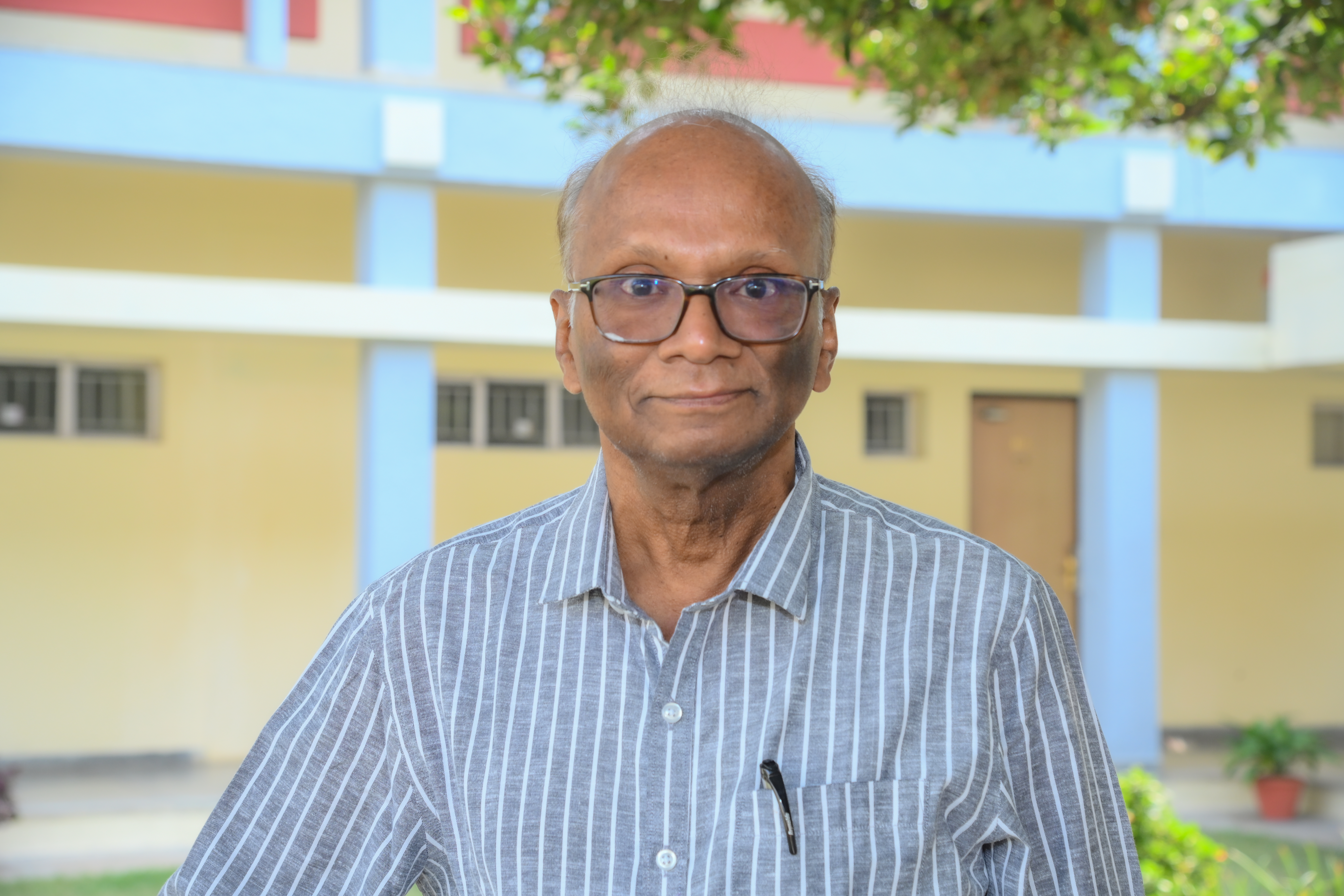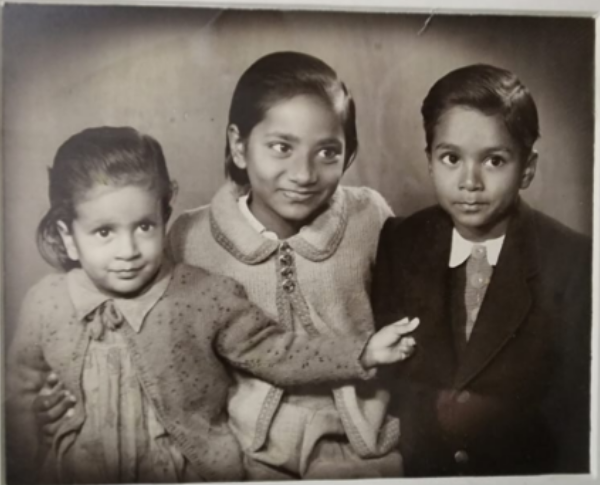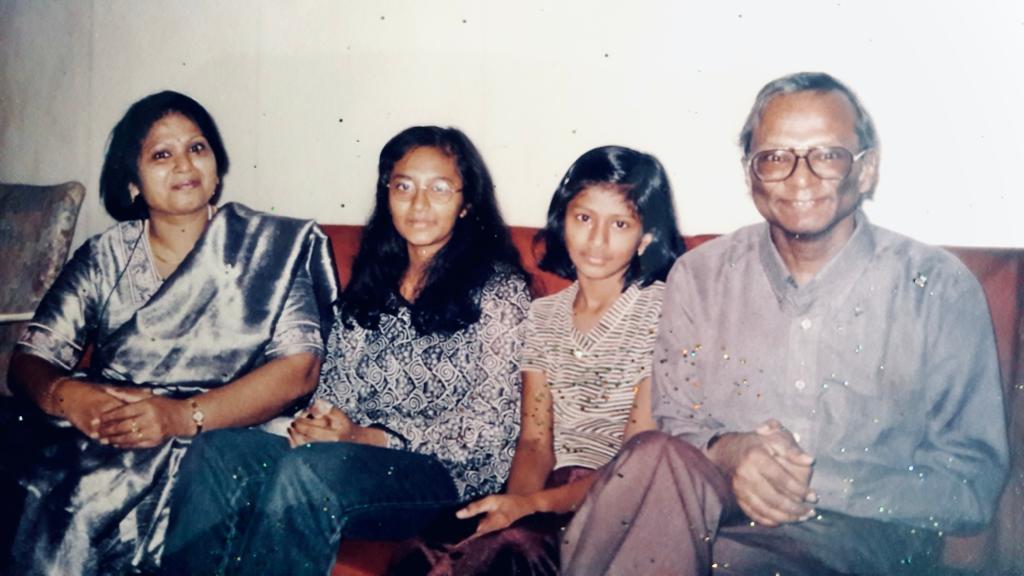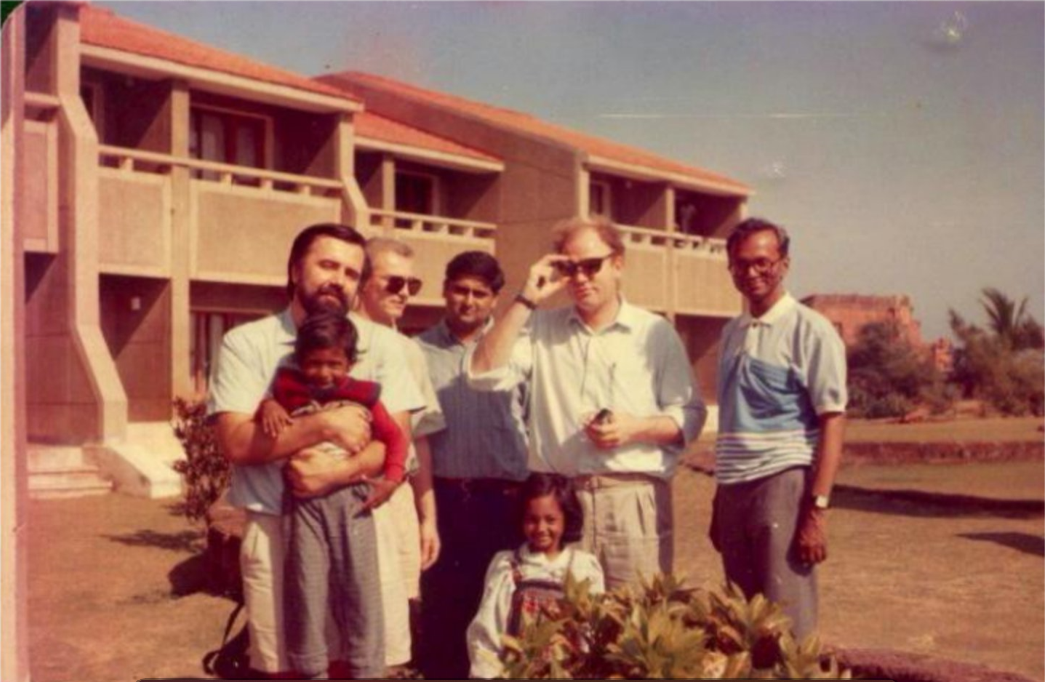Feature Article

Prof. Deepak Dhar, recipient of Padma Bhushan 2023 and IITK Distinguished Alumnus Award 2022, is a highly acclaimed theoretical physicist of India. In 2022, he became the first-ever Indian scientist to be chosen for the Boltzmann Medal, the highest recognition in Statistical Physics. Prof. Dhar has many more prestigious awards and honors to his name but it is his humility that he carries with him with pride.
1. Tell us about your days at school and at the University of Allahabad.
My father was an officer in the Uttar Pradesh state judicial service, and he was transferred from one city to another every few years. So, in my childhood, I did not stay in one city for more than a few years. The childhood was spent in many small towns in Uttar Pradesh: born in Pratapgarh in Uttar Pradesh in 1951, then, we moved to Agra, Moradabad, Meerut, Gonda, Bijnor, Pilibhit, Meerut (again), and then Muzaffarnagar. Then my father was transferred to Varanasi, and I went to University of Allahabad in 1968.
The result of this itinerancy was that I never developed any great attachment to any one city. Typically, in any city, I knew only the way from home to school, and the nearest market, and not much else. If you put me in one of these places now, I am likely to get lost. Of course, the cities have also changed a lot with time.

I remember that we were going by bus from Delhi to Roorkee in 1980, and we passed through Muzaffarnagar, where we lived during 1966-68. We lived in a government bungalow that used to be a billiard club for the British officers. It was rather a run down, but still had some old-world charm to it, and a very long verandah in front of the house. So, when the bus stopped at the station for 15 minutes, I slipped out to look at our old home again, which was within a short walking distance. Alas! There was no house. The building had been torn down. The compound was divided into four plots, and four apartment buildings had come up, for housing officers of the government. Why I recall this here is that the past we remember is very different from the present, and no longer there.

My two years at the University of Allahabad were not very memorable. The University is one of oldest British-type universities in India, and was then still considered the best in UP. But, all the good students there were expected to try to get selected for the IAS service. The most coveted hostel was the Amarnath Jha Hostel. But my father admitted me to the Sir Sunderlal Hostel, where he had been a student in his student days, and the superintendent then was his classmate.
Looking back, most of the classes were rather dull, but there were some good professors like A. K. De in Chemistry, Bipin Kumar Agrawal in Physics, H. P. Dixit in Mathematics, whose classes were interesting. I also fondly remember Dr. Arvind Kumar Malhotra, who was the instructor of our ‘General English’ classes, and who made us realize that an essay is not a mindless rote repetition of “A cow is a domestic animal. It has four legs, two eyes...”, but a way to communicate an idea or a viewpoint. He tried to get the students out of the conformist, non-thinking, instruction-following mode, and perhaps succeeded at least to some degree.
2. Had you not been a theoretical physicist, what would you have been and why?
I can not be sure. But, given my lack of proficiency in sports, or music, or acting, I could not have tried to become a `star’. Perhaps, I would have become a researcher in some other field of Science, or Mathematics. Or, failing that, a school teacher.

3. How did you develop an interest in Physics and who was your role model?
When I was a school student, for me, Newton was one of the most awe-inspiring figures. When I was in 10th grade or so, I remember reading popular science books about Galileo ( a book by Mir Publishers, from Moscow, who used to bring out low-cost books for Indian readers), and a biography of Marie Curie by her daughter. There were also popular science books by Einstein, and Bertrand Russel.
I was able to get good marks in Science, and hence had a good ‘academic record’, and managed to get admission to IITK, and later to Caltech. After that, I found Physics more interesting than Mathematics, and could solve some simple problems, and so, continued in it with more time-investment.
4. What are the applications of your research?
You know, this question is often asked from scientists, but one does not ask this from poets, or painters, or historians. But at some level, the scientists and these other professionals are all quite similar in that they are creative artists.
A theoretical physicist tries to understand the world around us. This understanding can be used to build various devices, which may help increase our quality of life. But, I think that applicability is useful, but not the only criterion to judge the usefulness of a work.
There was only one work of mine, which was of direct utility. It was about electroporation, a technique for drug delivery in cancer therapy using electric fields. Dr. S. B. Dev developed this technique, and started a company that brought the first device to market. My contribution was rather minor, related to the optimal design of needles for applying the field. This technique is used in clinical treatments of some types of cancer even now.
At Caltech, I was fortunate to take a two-semester course taught by the legendary Prof. Richard Feynman. Of course, he is an iconic figure to most theoretical physics students, and I had read his Feynman Lectures in Physics in my undergraduate days. But, listening to his clear no-nonsense way of presenting ideas without jargon was a revelation. I can honestly say that I never thought that I could be like him. But I have been influenced by his way of thinking in science, and tried to emulate it in my own work. If I have succeeded even to one part in ten, I am very happy to get that far.
5. Why did you choose academia over industry?
I was fascinated by theoretical physics, and the nature of the subject makes the possibility of its immediate applicability not so high. I did not seriously think of a career in industry. After Ph.D., I did appear for a job -seminar at Bell Labs, but was not selected.
6. What are your fondest memories of IITK?
I would not say that I was very happy as a student at IITK. I am inclined to be of a brooding disposition. But the things that I recall well, and value now were the interactions with my fellow students (some have developed into life-long friendships), the unveiling of the fascinating world of ideas in Physics, and many excellent teachers. At that time, I took these for granted, not realizing that this is not available to many others less-privileged. And finally, the aloo-parantha lunches on Sundays, which I remember now as tasting great. At that time, we just devoured them, no questions asked.
7. How can industry and academia collaborate to produce cutting-edge technology?
I am not able to say anything much about this, as I have not had much experience in this area. The work on electroporation that I mentioned earlier came about as Dr. Sukhendu Dev, then in the research and development branch of Hindustan Levers in Mumbai, would visit TIFR irregularly, and discuss his work. After many months of such unstructured discussions, we could identify a problem, where I could contribute a small bit. It was not a paid consultancy, and I realize that this can not be the standard operating procedure. But some willingness to work on less-glamorous problems on the part of academics, and some willingness to invest money and time, without guaranteed returns, on the part of industry seems to be prerequisites.
8. How is the approach to research different in the US/Europe from India? What can Indian educational institutions do to raise their research standards?
This is a difficult question. The fact that the fractional number of quality papers from India is less than what may be expected on the basis of fraction of world population, or even using the fractional number of actual papers published seems not to be disputed. If we take for granted that the innate ability of Indians is no less than of other races, the reason can only be different social structure, or inadequate training. I feel that the main reason is the latter. Many current professors themselves are not very committed to their work, and are not able to give good training to their students.
For example, as an external examiner, I have myself encountered some rather poor quality Ph.D. theses, even from good Indian institutions. When questioned, the advisors seem to feel that it is not possible to much better under Indian conditions. For example, ensuring that thesis has no spelling or grammatical mistakes is not considered necessary, and ensuring that they are fixed is too much work for the busy supervisor. Also, nowadays, there is the added problem that there are incentives for professors to have supervised many students, and time allowed per student is limited.
9. What has been your life's mantra?
I never thought of a mantra as such, but one persistent idea has been realization of the shortness of life. When I was sixteen, I was quite sure that I will live only till age 21. When I was 21, then the number changed to 26. And so on. I did not believe in long-term planning. I tried to use well the short time available. And there were no retirement plans, and I saw no point in cultivating grudges against others. Of course, I am a bit wiser now.
When I was about 30, a life insurance agent tried to convince me to buy life-insurance, where the policy will mature after some 20 years, and pay back with interest etcetera. I did not think that I was going to live so long, and still unmarried at that time, had no family responsibilities. Why should I buy insurance? Eventually I was persuaded to buy it `to save on income tax’, and was quite surprised that it did mature out eventually!
10. How would you sum up your life so far?
I have been very lucky, and have not encountered much adversity (like extreme poverty, or caste-, race- or gender- discrimination), and also that most people I have interacted with have been pleasant.
I was supported in my work by the government, and also emotional support from the the family and friends. Also, I have enjoyed my explorations in research, and also interacting with younger colleagues.

11. What is your message to IITK and its students?
I guess it is hard for me to give very clear advice. The world now is so different from what it was 50 years ago, that I am not sure that what we did, or tried to do when I was twenty would be a useful strategy for survival now. But, some basic truths still remain : the first is that youth is the best time of your life. Enjoy it, but also use your time wisely.
I guess the second is in making a career choice. One should take into account different aspects like your interests and skills, and moral issues, in addition to the salary. While this may seem quite banal, a very large fraction of young people, even the ones who can afford to, do not actually do this.